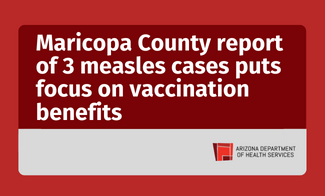 Today’s report of three measles cases in Maricopa County is a sobering reminder that this rare and highly contagious disease can flare among those who aren’t vaccinated.
Today’s report of three measles cases in Maricopa County is a sobering reminder that this rare and highly contagious disease can flare among those who aren’t vaccinated.
Before the U.S. introduced a vaccination program, measles was a common illness in infants, children, and young adults. It can be severe: Approximately two out of 1,000 people with measles die and one out of every 1,000 develops brain swelling that can result in permanent brain damage.
Measles spreads easily through respiratory droplets that can remain suspended in the air for up to two hours and by direct contact with droplets on surfaces. The most prominent symptom is a rash that usually starts on the head and slowly spreads to the rest of the body.
The good news is that the measles (MMR) vaccine is highly effective, and a high vaccination rate is the best way to prevent measles from spreading among those who can’t be vaccinated or who aren’t vaccinated for another reason. However, a worrying 90.6% of Arizona kindergarten students were vaccinated during the 2021–2022 school year, well short of the 95% threshold considered necessary to prevent localized outbreaks.
If your child doesn’t have their recommended immunizations for any reason, I encourage you to use this news from Maricopa County as a reason to talk with your child’s health care provider about the benefits of vaccine protection. Vaccines are safe and have a long history of keeping once-common diseases such as measles out of our homes, schools, and communities.
Other ways to reduce the spread of measles and many other diseases include thoroughly washing hands with soap, teaching children to wash their hands, refraining from sharing eating utensils, and routinely disinfecting toys and frequently touched surfaces such as doorknobs, tables, and counters.
For more information on measles, please visit azhealth.gov/measles. To learn about vaccines, including those recommended for young kids, please visit azdhs.gov/GetVaccinated.










